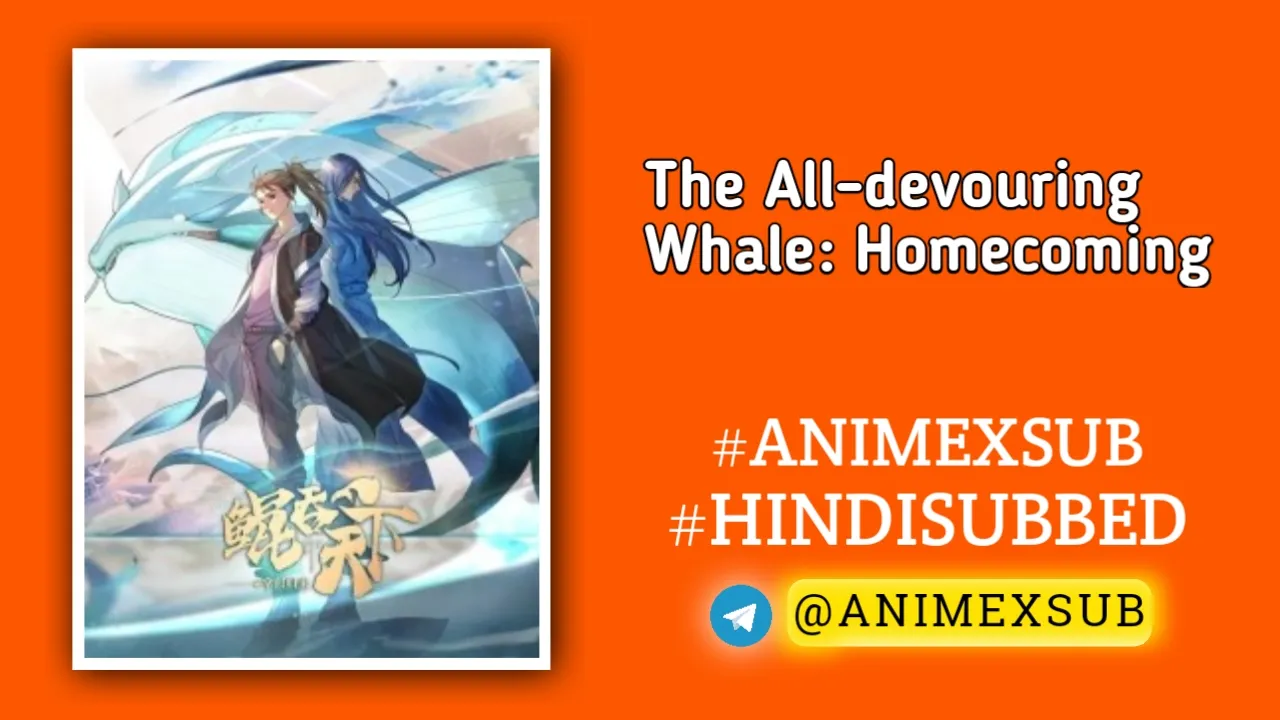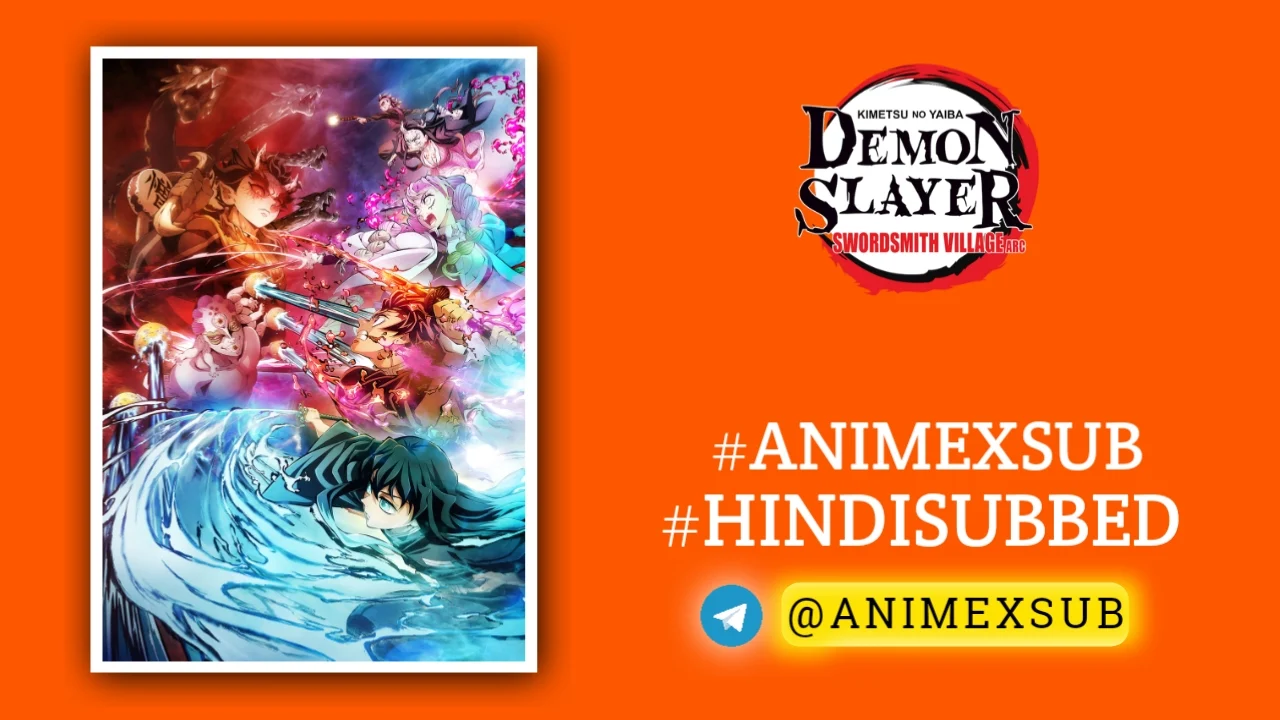
The All-devouring Whale: Homecoming Hindi Subbed [10/12] | Kun Tun Tianxia Zhi Zhang Men Guilai Hindi Sub!!

Kun Tun Tianxia Zhi Zhang Men Guilai
The All-devouring Whale: HomecomingSynopsis
Fan Lingxiao, a gifted spirit pet master, was ambushed in the A-level sect promotion competition and devoured by his own spirit, Kun. When he woke up, he found himself reincarnated into a young man named "Liu Fengmang" and imprisoned in the White Mansion. His sect, Lingxiao Pavilion, was also in dire straits. In order to find out the truth about the backlash of the spirit Kun and revive the sect, Fan Lingxiao takes his existing spirit pets and embarks on a new adventure with Gu Ling, Cheng Xi, and Yue Tong. (Source: Bilibili) Note: The first episode has a runtime of 36 minutes.
Watch Trailer
Characters
The All-Devouring Whale: Homecoming – A Bold Leap Forward for Donghua in Season 1
The All-Devouring Whale: Homecoming (2025), a Chinese donghua adapted from Mo’s manhua and animated by Big Firebird Culture, has emerged as a striking addition to the global animation landscape. Premiering on May 1, 2025, with a 12-episode first season, this series blends the monster-taming allure of Pokémon with the intricate power systems of wuxia and cultivation narratives, delivering a visually stunning and narratively ambitious experience. While not without flaws, Season 1 of The All-Devouring Whale distinguishes itself through its bold storytelling, breathtaking animation (at its peak), and a fresh take on familiar tropes, making it a standout in the evolving donghua scene. This review dives into the series’ strengths, weaknesses, and unique contributions to the medium, avoiding the promotional hype to offer a grounded, critical perspective.
A Reincarnation Tale Rooted in Betrayal and Redemption
The story centers on Fan Lingxiao, a prodigious spirit pet master and leader of the Lingxiao Pavilion, a sect of cultivators who tame and battle alongside spiritual creatures. In a shocking twist, Lingxiao is betrayed and devoured by his own spirit pet, a whale named Kun, during a high-stakes sect promotion competition. He awakens a year later in the body of Liu Fengmang, a disgraced young man imprisoned by the rival Bai sect, with his once-proud pavilion in ruins and fish-type spirit pets nearly extinct. Season 1 follows Fengmang’s quest to uncover the truth behind Kun’s betrayal, rebuild his sect, and navigate a world of political intrigue, spiritual battles, and personal redemption.
The narrative’s reincarnation premise, while familiar in cultivation stories, is executed with a distinct emotional weight. Lingxiao’s transition to Fengmang is not just a plot device but a lens to explore themes of identity, loss, and resilience. The series deftly balances high-stakes action with quieter moments of character reflection, such as Fengmang’s struggle to reconcile his past leadership with his new, tarnished identity. Unlike the manhua’s lighter, comedic tone, the anime adopts a more serious approach, amplifying the stakes of Lingxiao’s mission and the mystery surrounding Kun’s betrayal. This shift, while occasionally jarring for manhua readers, grounds the story in a way that feels cinematic and purposeful.
A World of Spirit Pets and Cultivation
The All-Devouring Whale introduces a richly imagined world where spirit pets—creatures with elemental powers—form the backbone of a cultivation-based society. The series draws clear inspiration from Pokémon, with spirit pets like the fire-wielding Fire Tail Fox or the pigment-manipulating Rhino Horn Panda engaging in dynamic battles alongside their masters. However, the donghua distinguishes itself by weaving these battles into a broader cultivation framework, where spiritual growth, clan rivalries, and mystical hierarchies drive the narrative. The spirit pet system is meticulously detailed, with Episode 3 offering an in-depth explanation of ranks, capture methods, and evolution processes, providing a satisfying depth for fans of intricate world-building.
The show’s setting is a visual feast, blending traditional Chinese aesthetics with modern animation techniques. Big Firebird Culture employs a hybrid of 2D and 3D animation, creating fluid character movements and expansive cityscapes that feel alive. The first two episodes, in particular, are a triumph of visual storytelling, with vibrant colors, dynamic camera angles, and a hauntingly beautiful score that elevates the action. Scenes of spirit pets clashing in lush forests or misty mountains are rendered with a tranquility that contrasts the chaos of battle, making every frame a testament to donghua’s growing technical prowess.
Strengths: Visual Spectacle and Narrative Ambition
Season 1’s greatest strength lies in its ability to elevate the source material. While the manhua is known for its gorgeous art and comedic tone, the anime refines its pacing and stakes, delivering a more cohesive and emotionally resonant story. The battles are a highlight, with choreography that rivals top-tier anime. For instance, the clash with the Rhino Horn Panda in Episode 3 showcases inventive use of the creature’s pigmentation powers, turning the environment itself into a weapon. The soundtrack, a blend of traditional Chinese instruments and modern orchestral elements, complements these sequences, adding gravitas to both action and drama.
The series also excels in its character dynamics. Fengmang’s interactions with his companions—Gu Ling, Cheng Xi, and Yue Tong—reveal layers of loyalty and tension within the fractured Lingxiao Pavilion. While the supporting cast could use more development (a common critique, as noted by IMDb reviewers), their camaraderie provides an emotional anchor. The introduction of antagonists like the Leisure Society and Su Muchuan adds moral complexity, as their motivations are tied to coercion and survival rather than simple villainy. This nuanced approach to conflict sets The All-Devouring Whale apart from more formulaic monster-taming narratives.
Weaknesses: Inconsistent Animation and Tonal Shifts
Despite its strengths, Season 1 stumbles in execution at times. Episode 3, in particular, marks a noticeable decline in animation quality, with stilted character movements and inconsistent scene editing that disrupt the visual flow established in the first two episodes. This drop, as noted by SoapCentral, is especially disappointing given the episode’s critical role in explaining the spirit pet system and introducing key antagonists. The shift toward a more comedic tone in this episode, aligning closer to the manhua, feels abrupt and may alienate viewers drawn to the anime’s initially serious approach.
Additionally, the series struggles with pacing and character development. While Fengmang’s arc is compelling, supporting characters like Gu Ling and Cheng Xi receive limited screen time, making their motivations feel underdeveloped. The show also omits key details from the manhua, such as the explanation of the catfish spirit pet Nian’s rapid growth or how Fengmang conceals its powers from bandits, leading to minor plot holes that attentive viewers may notice. These oversights, highlighted in Reddit discussions, suggest a rushed adaptation in parts, though the core story remains intact.
Unique Contributions to Donghua
What makes The All-Devouring Whale: Homecoming stand out is its ambition to bridge cultural and genre divides. By combining the monster-taming appeal of Pokémon with the philosophical depth of wuxia, it creates a hybrid that feels both nostalgic and innovative. The series’ exploration of betrayal—particularly the haunting image of Kun transforming into a decaying, monstrous form before devouring Lingxiao—adds a layer of psychological intrigue rare in the genre. This moment, depicted with visceral intensity in Episode 1, lingers as a narrative hook, promising deeper revelations in future seasons.
The donghua also contributes to the global rise of Chinese animation. Alongside series like To Be Hero X and Lord of the Mysteries, The All-Devouring Whale showcases donghua’s ability to compete with Japanese anime through high production values and universal storytelling. Its viral popularity, fueled by comparisons to Pokémon, reflects a growing appetite for non-Japanese animation that respects its audience’s intelligence while delivering spectacle. Reddit communities like r/Donghua have praised its seamless integration of 3D backgrounds with 2D character designs, a technical achievement that sets a new standard for the medium.
Critical Reception and Cultural Impact
Fan reactions have been largely positive, with the series earning an 8/10 from IMDb users for its animation, fights, and soundtrack, though some noted the lack of character depth. Social media buzz, particularly on Reddit, highlights the show’s ability to draw in both donghua enthusiasts and newcomers, with many praising its “jaw-dropping” landscapes and “sick” finale. However, critiques of Episode 3’s quality dip and occasional plot holes temper the enthusiasm, suggesting room for refinement in Season 2.
Culturally, The All-Devouring Whale represents a milestone for donghua’s global reach. Its availability on platforms like Bilibili, Rakuten Viki, and Prime Video, with English subtitles, has made it accessible to a wide audience, while its roots in Chinese mythology and cultivation resonate with viewers seeking fresh perspectives. The series’ success has sparked renewed interest in the manhua, with fans binge-reading its 274 chapters to prepare for the anime’s next arcs.
Final Verdict: A Flawed but Visionary Debut
The All-Devouring Whale: Homecoming Season 1 is a bold, imperfect gem that pushes donghua into new territory. Its stunning visuals, inventive battles, and emotionally charged narrative make it a must-watch for fans of monster-taming stories and cultivation epics alike. While inconsistencies in animation and pacing occasionally disrupt its momentum, the series’ ambition and cultural resonance outweigh its flaws. For those willing to overlook a few rough edges, The All-Devouring Whale offers a thrilling ride that redefines what donghua can achieve. As the wait for Season 2 begins, this series stands as a testament to the medium’s potential to captivate and innovate on a global stage.
Rating: 8.5/10
Watch it on: Bilibili, Rakuten Viki, Prime Video, or Apple TV.
Support Our Anime Community!
Love watching the latest anime? Help us keep uploading new episodes by join telegram channel ❤️
Join Now!



















Ye saare episode telegram pe kyu dete hi…koi simple link nahi h kya..
Abhi toh sirf telegram pe hi available hai